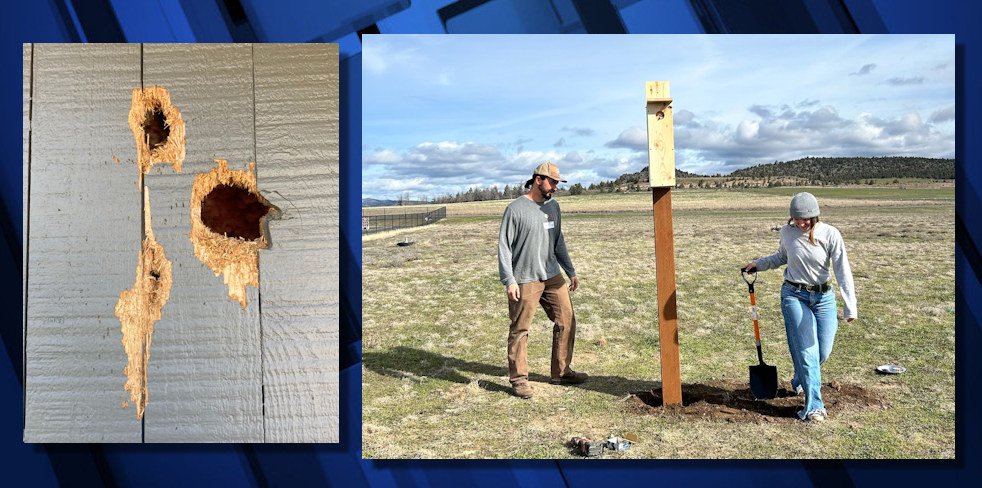Knock, knock! Think Wild offers more humane, effective ways to take care of northern flicker woodpecker woes

Wildlife experts say nest boxes beat trapping, killing the birds, for many reasons
BEND, Ore. (KTVZ) -- Knock, knock! Are your northern flicker neighbors causing a ruckus this spring? Think Wild, Central Oregon’s wildlife hospital, conservation and education center, said Tuesday it's offering some better solutions to issues with northern flickers to homeowners and businesses than trapping and extermination
Think Wild utilizes strictly humane wildlife mitigation strategies in Central Oregon. Instead of resorting to traditional methods like trapping and extermination, Think Wild emphasizes exclusion and habitat modification techniques to address conflicts.
These techniques are not just the more humane options; the organization says they are also statistically proven to be more effective than traditional pest control methods.
"By targeting the root causes of wildlife issues, Think Wild aims to establish sustainable coexistence between Central Oregon’s human and wildlife residents," the nonprofit says in its news release.
Northern flickers are a large species of woodpecker native to Central Oregon. They are drawn to buildings because the wood used in construction makes them the next closest structures replacing their preferred natural nesting place, standing dead trees.
Since humans typically remove dead trees, flickers attempt to excavate and nest in buildings, which provide warmth and shelter. This unfortunately comes at a cost - flickers can cause damage that is not only expensive, but the holes they excavate for nests can allow rodents and bats into buildings as well, leading to more wildlife conflicts.
If not properly addressed, flicker damage can incur the need for thousands of dollars of roofing repairs every few years!
Think Wild utilizes a simple but effective strategy to mitigate issues with northern flickers - installing flicker nest boxes. When properly installed, these boxes provide the exact nesting conditions that the flickers seek out, and attract the flickers away from homes where they are causing damage. Flickers are also fiercely territorial and will defend their nest sites from other flickers and woodpeckers.
You may also notice northern flickers making lots of noise on metal chimneys, roofs, and siding. Drumming is a form of communication and territory defense, but can be very noisy! Luckily, their drumming behavior usually does not cause damage.
Adding deterrents like mylar ribbon can be effective for preventing this behavior, or you can install a piece of vent material or sheet metal further away from your home to offer an alternative spot for the flicker to drum.
Understanding the timing of flicker nesting is crucial for effective management. Flickers are most active excavating nest sites and drumming between February and July, so now is the time to reach out to Think Wild if you are having issues with your avian neighbors!
It is important to keep in mind that Northern Flickers are protected under the Federal Migratory Bird Treaty Act, so it is illegal to harm them, destroy or move their nests. Instead, reach out to Think Wild for expert advice and solutions for problems like flicker nesting or other wildlife concerns.
Our services include consultations, exclusion techniques to keep wildlife out of unwanted areas, and nest boxes installation to provide alternative nesting spots for flickers.
According to one customer who had been struggling with flicker damage on the siding of her home, "Now there are two flickers hanging around the nest box (Think Wild installed) and they appear to be flirting! I would be so excited to have a nest and babies in there this spring. I can see the box directly from my desk, and it's such a fun distraction to watch them."
For support with northern flickers and other wildlife conflicts or habitat questions, reach out to Think Wild’s Wildlife Services Coordinator at wildlifeservices@thinkwildco.org or visit their website at thinkwildco.org/humane-wildlife-exclusion/.
###
About Think Wild
Think Wild is a 501(c)3 non-profit organization located in Bend, Oregon. Our mission is to inspire the High Desert community to care for and protect native wildlife through rescue and rehabilitation, outreach and education, and conservation. We provide veterinary treatment and care at the wildlife hospital, staffed by expert wildlife rehabilitation staff, animal husbandry volunteers, and our staff veterinarian. Wildlife conflicts or injuries can be reported to our Wildlife Hotline at (541) 241-8680, which is monitored seven days a week from 8 AM to 4 PM. Visit us online at thinkwildco.org, or on Instagram or Facebook @thinkwildco.